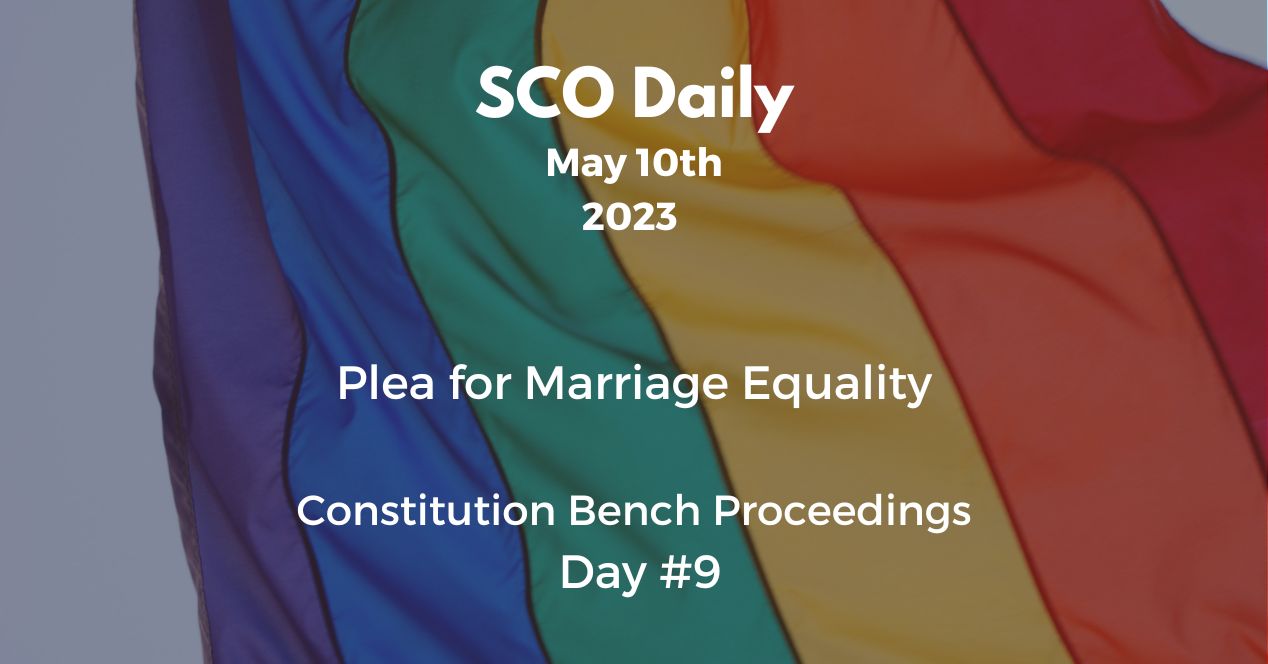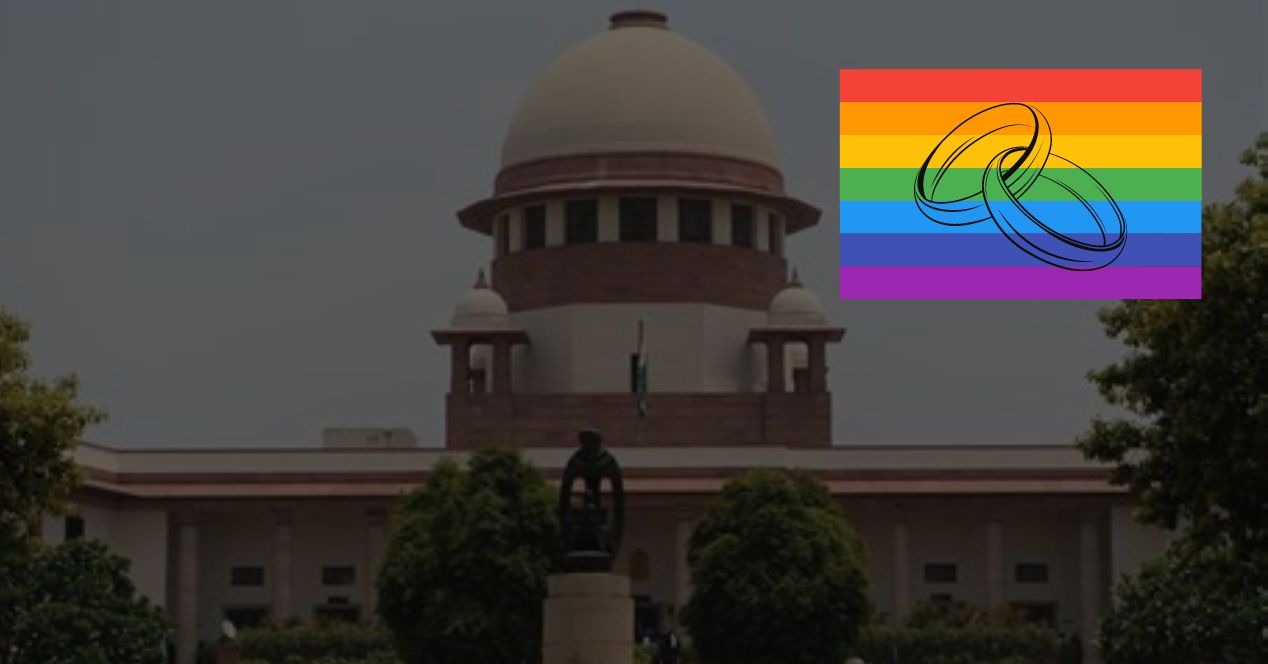Plea for Marriage Equality: Constitution Bench Day #9
Plea for Marriage EqualityJudges: D.Y. Chandrachud CJI, S.K. Kaul J, S.R. Bhat J, Hima Kohli J, P.S. Narasimha J
The Supreme Court heard arguments from Assistant Solicitor General Aishwarya Bhati against the legal recognition of marriage for LGBTQIA+ persons under the Special Marriage Act, 1954 (SMA). Sr. Adv. A.M. Singhvi commenced the rejoinder arguments on behalf of the petitioners.
Yesterday (May 9th), Sr. Adv. Arvind Datar traced the evolution of the SMA and argued it was enacted to facilitate inter-faith and inter-caste marriages. It cannot be challenged today on the ground that it excludes LGBTQIA+ persons.
Background
On November 14th, 2022, two same-sex couples filed writ petitions in the Supreme Court seeking legal recognition of same-sex marriages in India. The petitions were centred around the constitutionality of the Special Marriage Act, 1954 (the Act).
The petitioners argued that Section 4(c) of the Act only recognises marriage between ‘male’ and a ‘female’ persons. This discriminates against same-sex and other queer couples by denying them the same matrimonial benefits as heterosexual couples.
According to petitioners, the non-recognition of same-sex marriage violates the rights to equality, freedom of expression and dignity. They claimed that the SC’s judgements in NALSA vs Union of India (2014) and Navtej Singh Johar vs. Union of India (2018) recognised non-binary gender identities and guaranteed equal rights to homosexual persons. However, since no law regulates queer marriages, queer couples are denied the practical benefits that flow out of marriage such as inheritance, insurance, adoption, etc.
On March 12th, 2023, the Union filed a Counter Affidavit opposing same-sex marriages. They claimed that ‘the notion of marriage itself necessarily and inevitably presupposes a union between two persons of the opposite sex’.
On March 13th, 2023, a 3-Judge Bench led by CJI D.Y. Chandrachud referred the case to be heard by a 5-Judge Constitution Bench as it involved constitutional as well as statutory questions of law.
AGS Aishwarya Bhati: Heterosexual Marriages Protect the Welfare of Children
Ms. Bhati commenced today’s arguments by focusing on the welfare of children. She claimed that the ideal situation for a child to grow up is a family formed out of a heterosexual marriage as it is the most stable environment. The State has a ‘legitimate interest’ in child welfare, in turn, it has an interest in the institution of marriage as well. This is because children are only born through heterosexual unions.
The ASG went on to argue that adoption is the exception and biological birth is the norm. Even in matters of adoption, the State has taken extreme steps to ensure that children are brought up by a nurturing family. The Central Adoption Resource Authority Guidelines (CARA Guidelines) played a crucial role in ensuring the same. She relied on a study from Pennsylvania University to show that children born and raised by heterosexual parents showed the best development.
The Bench pointed out that the law allows a single individual to adopt. Therefore if a person chose to be in a live-in relationship, was the right to adopt available to them?? Ms. Bhati replied that, as the law stands now, for a couple to adopt, they have to be heterosexual. The ASG concluded her arguments by stating that altering the text of the Special Marriage Act, 1954 would risk having a negative impact on the welfare of children.
Adv. Sai Deepak: Societal Discourse is Essential in Process of Creating New Social Institutions
Mr. Deepak appeared representing a women’s welfare group. When a change in the law that impacts the society is sought, he argued that society must be part of the debate in the process. By seeking a declaration from the SC, the petitioners were demeaning the values of democracy and seeking a substitute to the legislative process.
He went on to argue that when a change is made in the law, first both Houses of Parliament need to pass it and then the President has to assent to it. Seeking a declaration from the SC, therefore breached the separation of powers.
Clarifying that he was not against the idea of a change, but how it was sought, Mr. Deepak maintained that those who seek to bring about a change in society must engage with society. They cannot substitute this process of change with a declaration from the Court.
Changes in Law Must be Made by Parliament
The Bench also heard arguments by Sr. Advs. Maninder Singh, Manisha Luvkumar and Advs. Priya Aristotle, M.R Shamshed appearing for various interveners in the case. They reiterated that altering the SMA would have a ripple effect on other laws and that changes in the laws must be made through a legislative process and not a judicial one. They also pointed out cases in other countries such as Italy where marriage recognition of non-heterosexual couples was denied.
Adv. Sasmit Patra (for Member of Parliament Mr. Joby Varghese) argued that only Parliament has the capacity to handle a mammoth task like recognising the right to marry for the LGBTQIA+ community. Further, leaving it to Parliament ensures that larger society has a say in the matter through their elected representatives.
Solicitor General Tushar Mehta bookended the respondent’s submissions. He agreed that only Parliament is prepared to handle this task. Further, he said that the SC should withhold from recognising the right to marry, even if it is in the form of a general declaration and the right wasn’t read into the SMA. He quoted Justice Roberts’ dissent in Obergefell (2015) which spoke about the dangers of circumventing the legitimate political process. Justice Roberts’ claimed that the LGBTQIA+ community would receive more social acceptance if a law was enacted through a deliberative process than if it was recognised by the Supreme Court.
Dr. Singhvi: SC is not Creating Judicial Legislation and should Ignore ‘Scare’ Arguments from the Union
Senior Advocate Dr. A.M. Singhvi fired the opening salvo against the respondent’s arguments. He urged the Court to exercise their power to it’s fullest ability, and not to withhold the right to marry in the hopes that Parliament will eventually draft a law. It is well within the Court’s power to recognise the discriminatory nature of the language in the SMA and require the word ‘spouse’ to replace ‘husband’ and ‘wife’. Dr. Singhvi likened it to the arguments against discrimination made in Navtej Singh Johar (2018).
The Bench was not ready to accept this argument. Justices Bhat and Kohli remarked that the petitioners were not arguing for the SMA provisions to be struck down, as would be typical when claiming discrimination. Dr. Singhvi stated that the exclusion of LGBTQIA+ persons in the statute is what must be struck down.
Further, he replied to the Union’s argument that the Court could not create ‘judicial legislation’ by reading down the SMA. The Court was simply including a class that was otherwise excluded from the scope of the law.
Finally, Dr. Singhvi responded to what he called the ‘scare’ argument from the respondents’ side. He highlighted the constant refrain about how the Court could not avoid issues of personal law and other legislation if it chooses to re-interpret the SMA. Dr. Singhvi claimed that this issue was almost entirely limited to the references to succession under the SMA. His main suggestion was to insert the word ‘spouse’ into the Hindu Succession Act, 1956 and Indian Succession Act, 1925 as well. The Bench balked at this suggestion. Justice Bhat said this amounted to ‘willy-nilly’ entering in the realm of personal law.
Before breaking for the day, Sr. Adv. Mukul Rohatgi made a final suggestion. If the Court is prepared to recognise marriage equality, but not under the SMA, there is an alternative. Couples require valid documentation of marriage for official purposes, so couples can draft an affidavit recognising each other as spouses. The Court could recognise this as valid registration of marriage under Section 18 of the Registration Act, 1908.
The Bench is expected to conclude hearing arguments tomorrow (May 11th, 2022).


